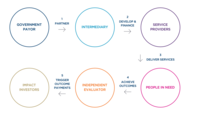
Photo from wikipedia
Purpose: With the temporary housing of rough sleepers in response to the Covid-19 emergency, some commentators have been tempted to believe that the rising population of rough sleepers in the… Click to show full abstract
Purpose: With the temporary housing of rough sleepers in response to the Covid-19 emergency, some commentators have been tempted to believe that the rising population of rough sleepers in the UK has finally been reversed. This paper aims to examine the choices made by persistent rough sleepers and how far they are influenced by the perverse incentives of social policies, in order to challenge the view that they sleep rough out of choice. Design/methodology/approach: Evidence for this paper is derived from two teams of frontline service providers with routine familiarity with the rough sleeping population: a street outreach team and a team of support workers working with adults with multiple and complex needs. Primary data from focus groups were combined with the secondary analysis of both numerical and narrative accounts routinely recorded by both teams. Findings: The exercise of agency by persistent rough sleepers is constrained by a mixed baggage of complex needs, past negative risk assessments, limited resources and regulatory deterrents to generate choices to reject help that appear irrational. These need to be understood if recent policy initiatives to end rough sleeping are to be effective. Originality/value: The paper draws on the experience and comprehensive records of practitioners with intimate knowledge of the rough sleeping population. It extends narrative accounts of causes by focusing on key choices to show how the perverse incentives of policy combine with personal factors to incline rough sleeping to persist.
Journal Title: Housing, Care and Support
Year Published: 2020
Link to full text (if available)
Share on Social Media: Sign Up to like & get
recommendations!